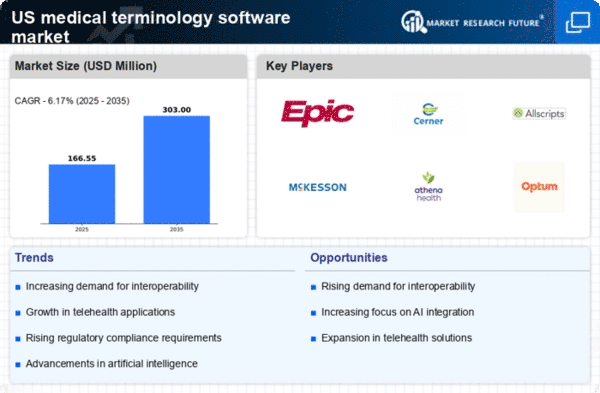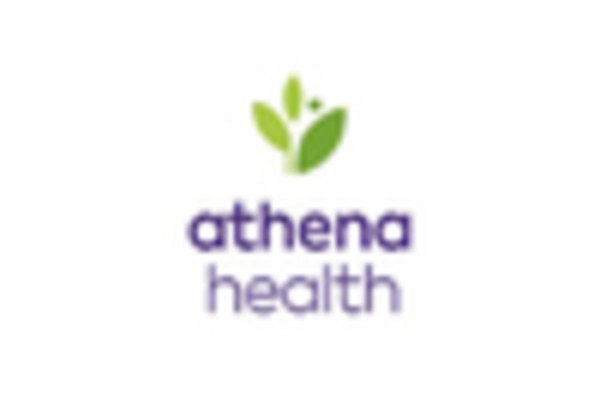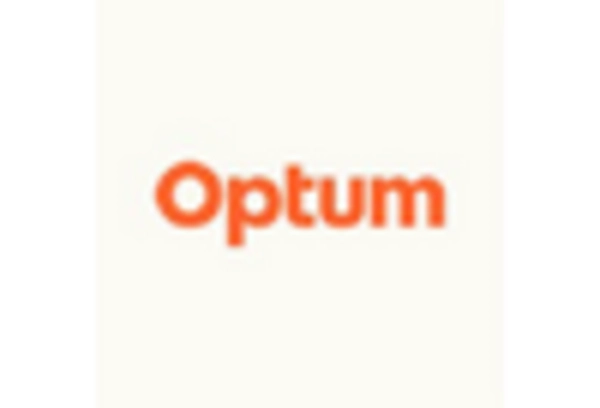Increased Focus on Patient Safety
Patient safety remains a top priority within the healthcare industry, significantly impacting the medical terminology-software market. Accurate medical terminology is essential for preventing errors in patient care, particularly in medication administration and treatment protocols. As healthcare organizations strive to enhance patient safety measures, the demand for software that ensures precise terminology usage is likely to rise. In 2025, it is projected that investments in patient safety technologies will exceed $5 billion in the US. This focus on safety not only drives the adoption of medical terminology software but also encourages the development of advanced solutions that integrate safety features, thereby fostering a culture of quality care.
Advancements in Telehealth Services
The rise of telehealth services is reshaping the landscape of the medical terminology-software market. As more healthcare providers offer remote consultations, the need for precise medical terminology becomes critical to ensure effective communication between patients and providers. In 2025, it is anticipated that telehealth will account for approximately 30% of all healthcare visits in the US. This shift necessitates the integration of medical terminology software that can support virtual care environments, enhancing the accuracy of diagnoses and treatment plans. Consequently, the medical terminology-software market is likely to experience growth as telehealth continues to gain traction, driving demand for innovative solutions that cater to this evolving healthcare model.
Regulatory Compliance and Standardization
Regulatory compliance is a significant factor influencing the medical terminology-software market. Healthcare organizations in the US are required to adhere to various regulations, such as HIPAA and ICD-10 coding standards. These regulations mandate the use of standardized medical terminology to ensure accurate documentation and billing practices. As compliance becomes increasingly stringent, healthcare providers are investing in software solutions that facilitate adherence to these standards. The medical terminology-software market is projected to expand as organizations prioritize compliance, with an estimated growth rate of 10% annually. This trend underscores the importance of integrating reliable terminology software to mitigate risks associated with non-compliance.
Rising Demand for Electronic Health Records
The increasing adoption of electronic health records (EHR) in the healthcare sector is a primary driver for the medical terminology-software market. As healthcare providers transition from paper-based systems to digital solutions, the need for accurate medical terminology becomes paramount. In 2025, it is estimated that over 85% of hospitals in the US utilize EHR systems, which necessitates robust medical terminology software to ensure proper coding and billing. This shift not only enhances patient care but also streamlines administrative processes, thereby driving the demand for specialized software solutions. the medical terminology-software market is expected to grow alongside this trend, as healthcare organizations seek to improve efficiency and compliance with regulatory standards.
Growing Need for Data Analytics in Healthcare
The increasing emphasis on data analytics within the healthcare sector is a notable driver for the medical terminology-software market. As healthcare providers seek to leverage data for improved decision-making and patient outcomes, the role of accurate medical terminology becomes crucial. In 2025, it is estimated that the healthcare analytics market will reach $50 billion in the US, highlighting the demand for software that can effectively manage and analyze medical data. This trend suggests that medical terminology software will need to evolve to support data integration and analytics capabilities, thereby enhancing its value proposition in the healthcare ecosystem. The medical terminology-software market is poised for growth as organizations recognize the importance of data-driven insights.
















